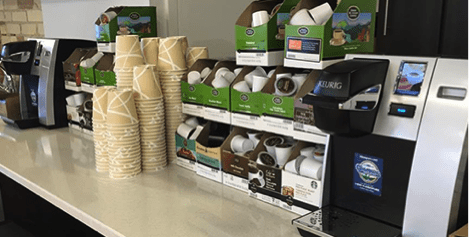
Simplify the Coffee Run: How Office Coffee Delivery Saves Time
It’s a familiar scene in offices worldwide: a line of employees standing outside the local café, each waiting for their cup of coffee before beginning their workday. Not only does this daily ritual consume precious time, but it can also dent employee productivity and cost companies in lost hours. Enter the solution: office coffee delivery services. Let's delve into how swapping out those morning coffee runs with office deliveries can be a game-changer.
A Comparative Look: Morning Coffee Runs vs. Office Deliveries
1. Time Spent in Queues
Everyone loves their coffee, but not the waiting time it often comes with. An average employee might spend anywhere from 10 to 20 minutes waiting in line at the café. Multiply that by the number of workdays, and we're talking about significant hours lost over a month. In contrast, office coffee deliveries provide a consistent supply of coffee, right when you need it, eliminating any waiting time.
2. The Commute to the Coffee Shop
Depending on the proximity of the nearest coffee shop to the office, employees might waste 5-15 minutes just walking to and from the café. With office deliveries, this commute is cut down to zero, allowing employees to channel that energy elsewhere.
3. Consistency is Key
A major advantage of office coffee delivery services is the consistency in the quality and taste of the brew. Morning coffee runs can be a hit or miss, with potential inconsistencies in brew strength, flavor, and even order mix-ups. With office deliveries, you’re guaranteed the same high-quality coffee every time.
4. Avoiding Peak Hour Rush
Most employees seek their coffee during peak morning hours, coinciding with the coffee shop’s busiest times. This can further lengthen the wait. On the other hand, office coffee delivery services can be scheduled to ensure timely delivery, allowing employees to kick-start their day without delays.

The Unseen Benefits Beyond Time Savings
Cost-Efficiency for Companies and Employees
While the immediate benefit of office coffee delivery services is time-saving, there’s also a financial aspect to consider. Regular coffee purchases can add up for employees. For companies, providing coffee can be seen as an added perk, contributing to employee satisfaction. When you factor in the lost hours from those coffee runs, the company’s indirect costs also rack up. Having coffee delivered to the office can lead to considerable savings in the long run.
Boosting Productivity
The time employees save by not making those daily coffee runs can be reinvested into their work, leading to increased productivity. Moreover, having a constant supply of caffeine on hand can keep energy levels high throughout the day.
Fostering Workplace Relationships
Having coffee available within the office encourages employees to take breaks together, fostering better interpersonal relationships and improving team dynamics.
Customization and Variety
Office coffee delivery services often come with a variety of options, allowing employees to choose their favorite brews. This customization ensures everyone gets their preferred caffeine fix, without the hassle of placing individual orders at a café.
In an era where every minute counts, businesses are continually seeking ways to streamline operations and maximize efficiency. By shifting from the traditional coffee run to an office coffee delivery service, companies not only save valuable time but also enhance the overall work environment. After all, when coffee is just a step away, every hour feels golden.

How Much Do Office Coffee Services Cost?
Choosing to implement an office coffee delivery service is not just about the convenience and productivity benefits; it's also important to consider the costs. The pricing of office coffee services can vary significantly based on several factors, such as the quality of the coffee, the frequency of delivery, the volume consumed, and any additional amenities provided. Here's a comprehensive breakdown of what businesses can expect to invest when adopting an office coffee service.
Average Costs of Office Coffee Services
As of 2023, the general pricing structure for most office coffee delivery services can be categorized into a per-cup or a monthly subscription model:
- Per-Cup Model: In this model, companies are billed for each cup of coffee consumed. Prices can range from $0.30 to $0.70 per cup for standard blends. Premium or specialty blends might fetch a higher price, possibly reaching up to $1.50 per cup.
- Monthly Subscription Model: Businesses that have a predictable consumption rate might prefer a monthly subscription, which offers unlimited coffee for a set monthly rate. These subscriptions typically start at around $100 for small offices (10-15 employees) and can go up to $1,000 or more for larger enterprises with hundreds of employees.
Factors Influencing the Cost
1. Coffee Quality and Origin: Specialty beans, organic options, or fair-trade coffees tend to be pricier. For businesses that prioritize gourmet blends or ethically sourced beans, there might be a slight uptick in costs.
2. Equipment Included: Some services might offer complimentary use of coffee machines as part of their package, while others could charge an additional fee or require companies to have their equipment.
3. Frequency of Delivery: While many businesses opt for weekly deliveries, those with a higher coffee consumption rate might need more frequent refills, adding to the cost.
4. Additional Amenities: Some providers offer more than just coffee. They might include tea options, hot chocolate, flavored syrups, and other beverages. Additionally, creamers, sugars, and eco-friendly cups and stirrers can also be part of the package, each influencing the overall cost.
5. Customization: Tailored solutions, such as specific blends or branded coffee cups, might come with an extra charge.
Long-term Savings and ROI
While there's an undeniable cost associated with office coffee services, it's essential to weigh this against the potential savings. When employees no longer make daily trips to the café, the indirect savings in regained productive hours can be substantial. Additionally, the perk of a free or subsidized coffee can lead to increased employee satisfaction and retention, both of which offer long-term financial benefits.

Office coffee service costs are flexible and can be adjusted to fit various budgets and preferences. By understanding the associated costs and weighing them against the tangible and intangible benefits, businesses can make an informed decision that's both economically savvy and morale-boosting.
Environmental Impact and Sustainability
In today's age of heightened environmental consciousness, businesses are not just aiming for profits but also looking for ways to reduce their carbon footprint. Office coffee delivery services have not been left behind in this green revolution. Recognizing the need to contribute to a sustainable future, many coffee delivery providers are implementing innovative approaches to minimize environmental impact and cater to the eco-conscious clientele.
- Organic Coffee Options: The demand for organic products is on the rise, and coffee is no exception. Organic coffee is grown without the use of synthetic pesticides and fertilizers, which means fewer chemicals are introduced into the environment. By opting for organic blends, offices not only offer healthier options for employees but also support environmentally-friendly farming practices.
- Waste Reduction: Single-use plastics and other non-biodegradable waste materials are a significant concern in many industries. Leading coffee delivery services are now prioritizing waste reduction by offering bulk coffee dispensers, allowing employees to refill their mugs or cups. This move drastically reduces the number of disposable cups, lids, and stirrers that end up in landfills.
- Recyclable Packaging: Another commendable step in the sustainability journey is the transition to recyclable or compostable packaging. Instead of plastic containers or non-recyclable bags, some coffee delivery services provide their coffee in biodegradable bags or containers made from recycled materials. This shift ensures that even after the coffee is consumed, its packaging doesn't harm the environment.
- Eco-friendly Delivery Methods: Reducing carbon emissions is crucial in fighting global warming. Aware of this, some coffee delivery services are adopting eco-friendly delivery methods. This could range from using electric delivery vans, optimizing delivery routes to reduce mileage and fuel consumption, or even partnering with local roasters to cut down on transportation distances.
- Educating Customers: Beyond just offering sustainable services, many providers take it a step further by educating their clients on best practices. Whether it's information on how to compost used coffee grounds, or tips on how to further reduce waste in the office, this educational aspect ensures that the sustainability efforts don't end at delivery.
The coffee industry, like many others, is recognizing its role in shaping a sustainable future. By choosing an office coffee delivery service that prioritizes environmental impact and sustainability, businesses can enjoy their daily brew knowing they're contributing to global eco-friendly efforts.

The Role of Technology in Office Coffee Services
The integration of technology in various industries has paved the way for enhanced efficiency, convenience, and customization — and the realm of office coffee services is no exception. Modern technological advancements have significantly transformed the way offices manage their coffee provisions, leading to a seamless and personalized experience for both the management and the employees. Here’s a closer look at how technology is reshaping the landscape of office coffee services.
- Order Management Systems: Gone are the days when one had to manually keep track of coffee stock and place reorder requests via phone calls or emails. With sophisticated order management systems in place, offices can now automatically monitor coffee stock levels. When stocks run low, these systems can place refill orders automatically, ensuring that the office never runs out of its caffeine supply.
- Mobile Apps: Many coffee delivery services have developed user-friendly mobile apps that allow offices to manage their coffee orders on the go. Whether it’s changing the type of coffee, adjusting delivery frequency, or even pausing services during holidays, everything can be controlled with just a few taps on a smartphone.
- Employee Customization: In an era where personalization is key, some advanced coffee service providers offer platforms where employees can set their coffee preferences. Whether someone enjoys a strong espresso, a dairy-free latte, or a flavored cold brew, these platforms ensure that every cup of coffee is made exactly to individual preferences, boosting employee satisfaction.
- Smart Coffee Machines: The evolution of coffee machines has been nothing short of impressive. Modern coffee machines, often integrated with IoT (Internet of Things), can brew coffee based on specific preferences, alert when maintenance is needed, and even provide usage analytics. Such insights can help offices understand consumption patterns and make data-driven decisions about their coffee provisions.
- Sustainability Tracking: As offices become more environmentally conscious, some coffee service platforms offer sustainability tracking features. These tools can provide insights into how much waste the office is saving by using recyclable products or how their choice of organic coffee is promoting eco-friendly farming practices.
- Feedback Mechanisms: The role of feedback in improving services cannot be overstated. Some tech-driven coffee delivery services incorporate feedback tools within their platforms, allowing users to rate the coffee, suggest changes, or report issues. This real-time feedback helps providers to continuously refine their offerings, ensuring a consistently high-quality service.
Technology's involvement in office coffee services has bridged the gap between demand and supply, ensuring that offices get what they want, when they want it, and precisely how they want it. This seamless integration of tech ensures not only convenience but also a coffee experience that can be tailored to the unique needs and preferences of each office and its employees. As technology continues to evolve, it’s exciting to envision the future possibilities in the office coffee service domain.

Creating a Coffee Culture in the Office
Coffee has long held a special place in the fabric of workplaces around the world. More than just a beverage, it symbolizes a ritual, a moment of respite, and even an avenue for casual interactions. Establishing a thriving coffee culture in the office goes beyond merely ensuring everyone has access to their caffeine fix; it's about fostering an environment that promotes camaraderie, collaboration, and innovation. Here's how the simple act of brewing and consuming coffee can remarkably influence the dynamics within an office setting.
Fostering Informal Interactions
The coffee machine or break area becomes a focal point for casual interactions. Employees from different departments or teams, who might not typically interact in the course of their day-to-day tasks, often find themselves sharing a coffee break. These unplanned chats can be the birthplace of innovative ideas, as people from varied backgrounds and skill sets share their insights and perspectives.
Building Relationships
As employees congregate around the coffee pot or take a moment to relax in the break room, they get an opportunity to know their colleagues on a more personal level. Over time, these casual conversations help in building trust and understanding among team members, which can be pivotal in enhancing collaboration in formal work settings.
Breaking Down Hierarchies
The coffee break area can be a great leveler. It's not uncommon to find senior executives pouring a cup alongside entry-level employees. These interactions outside the rigid structure of boardrooms can help in demystifying leadership and making them more approachable.
Boosting Morale and Well-being
A steady supply of good-quality coffee shows employees that their well-being and comfort are valued. Knowing that the management invests in small comforts for the team can boost morale and enhance overall job satisfaction.
Promoting Mental Rest and Rejuvenation
Taking short breaks to grab a cup of coffee can be rejuvenating. It allows employees a moment to step back from their work, clear their minds, and return with renewed energy and perspective. These short intervals can enhance productivity and reduce feelings of burnout.
Creating Traditions
Some offices have set ‘coffee times' or weekly ‘coffee catch-ups,' where teams come together for a collective break. These traditions can be essential in establishing team cohesion and ensuring that members take time out of their busy schedules to connect and communicate.

Curating a robust coffee culture in the office is more than just a nod to a beloved beverage. It's about recognizing and harnessing the potential of these small moments of connection and relaxation. When thoughtfully integrated, coffee can become more than just a drink—it becomes a catalyst for collaboration, innovation, and fostering a sense of community within the workplace.
Comparing Traditional Coffee Machines vs. Single-Serve Options
As coffee maintains its throne as the preferred office elixir, a debate brews in many workplaces: Should they invest in traditional coffee machines or opt for the newer, single-serve options? Both have their proponents and critics, and the decision often rests on multiple factors, from convenience and waste to flavor consistency and cost. Let's break down these two prevalent office brewing methods to help guide your coffee decision-making.
1. Convenience:
- Traditional Coffee Machines: These machines can brew large pots of coffee, making them ideal for offices where many employees drink coffee around the same time, like during a morning rush. Once brewed, anyone can quickly pour themselves a cup without waiting.
- Single Serve Options: These are perfect for on-demand coffee cravings. Employees can make a fresh cup whenever they like, selecting their preferred flavor or strength. There's no waiting around for a new pot to brew, but there may be a short wait if multiple people are queuing.
2. Waste:
- Traditional Coffee Machines: They often lead to less waste in terms of coffee grounds since it's brewed in bulk. However, there's a potential for leftover coffee, which might be thrown out if it's not consumed promptly.
- Single Serve Options: While they reduce the waste from unused coffee, single-serve machines often utilize plastic or aluminum pods, which can be an environmental concern unless they're recyclable or biodegradable.
3. Flavor Consistency:
- Traditional Coffee Machines: The flavor might vary from pot to pot, depending on the amount of coffee used and the brewing time. There's also a risk of coffee sitting on a hot plate for too long, leading to a burnt taste.
- Single Serve Options: They offer more consistent flavor since each cup is brewed using a pre-measured amount of coffee. The freshness is guaranteed, as every cup is made on-the-spot.
4. Cost:
- Traditional Coffee Machines: The initial investment in a good machine can be high, but the cost per cup tends to be lower in the long run. Buying coffee grounds or beans in bulk is typically cheaper than purchasing individual pods.
- Single Serve Options: The machines might be more affordable upfront, but the cost per cup is generally higher. While the convenience and variety of flavors are a draw, it's essential to consider the ongoing expense of pods.

5. Variety and Customization:
- Traditional Coffee Machines: Limited to the type of coffee ground or bean used. While there might be a few different pots with varying flavors, the options are often limited.
- Single Serve Options: Employees can enjoy a diverse range of flavors, strengths, and even beverages like hot chocolate or tea. It's an excellent option for offices with diverse taste preferences.
The choice between traditional coffee machines and single-serve options is multifaceted. While traditional machines might suit larger offices with high simultaneous coffee demand, single-serve machines cater to the modern desire for variety and individualized experiences. It's crucial to gauge your office's unique needs, preferences, and budget constraints before making a decision.
The Psychological Boost of a Coffee Break
The daily grind of office work, while necessary, can be mentally taxing. From meeting tight deadlines to navigating complex interpersonal dynamics, the challenges are endless. Amidst this whirlwind, the humble coffee break emerges as an unsung hero, offering not just a caffeine boost but also a plethora of psychological advantages. Let’s delve deeper into the mental reprieve that this short pause provides.
1. A Moment of Respite: Amid continuous work, the brain can get fatigued, reducing productivity and creativity. A coffee break acts as a mini-reset, allowing the mind to relax, rejuvenate, and regain focus. Even a short five-minute break can make a considerable difference in refreshing one's mental state.
2. Social Interaction: Coffee breaks often become informal social gatherings. Engaging in light, non-work-related conversations with colleagues can foster camaraderie and strengthen team bonds. This interpersonal connection can reduce feelings of isolation, especially in large corporate settings.
3. Breaking Monotony: Repetitive tasks can make days seem monotonous and draining. The simple act of standing up, stretching a bit, and walking to the coffee machine can break this monotony, introducing a change of scenery and pace.
4. Mindfulness and Presence: Sipping coffee can be a mindful activity. The aroma of the brew, the warmth of the cup, and the taste can anchor individuals to the present moment, allowing them to practice brief mindfulness, which has been shown to reduce anxiety and stress.

5. A Chance to Reflect: Away from the computer screen and the immediacy of tasks, the coffee break offers a window for reflection. Employees can mull over decisions, think about their day, or even brainstorm solutions to problems in a more relaxed environment.
6. Mitigating Stress: Stress is a common workplace companion. Regular short breaks, like a coffee interlude, can act as stress-relievers. Beyond the caffeine, the act of taking a step back from pressing tasks provides a buffer, reducing the immediate feeling of pressure.
7. Boosting Morale: Knowing that a coffee break is on the horizon can serve as a small yet effective morale booster. The anticipation of a short relaxation period can make challenging tasks more bearable and provide something to look forward to.
While the caffeine in coffee is celebrated for its energy-boosting properties, the coffee break itself plays a pivotal role in employee well-being. It's more than just a beverage pause; it's a holistic experience that caters to the mind, offers solace during hectic times, and revives the spirit. Employers and employees alike should recognize and cherish the value of this modest, daily ritual.
Author: Hudson Piccini
Hudson Cynar, a Harvard University alumna and the owner of three prosperous enterprises, is a distinguished business consultant, author, and writer. Her expertise spans multiple business sectors, with a particular emphasis on storage containers, commercial copiers, payroll services, and medical billing software. Dedicatedly investing thousands of hours into product and service research, Hudson crafts insightful reviews to guide entrepreneurs in making informed decisions for their businesses.
